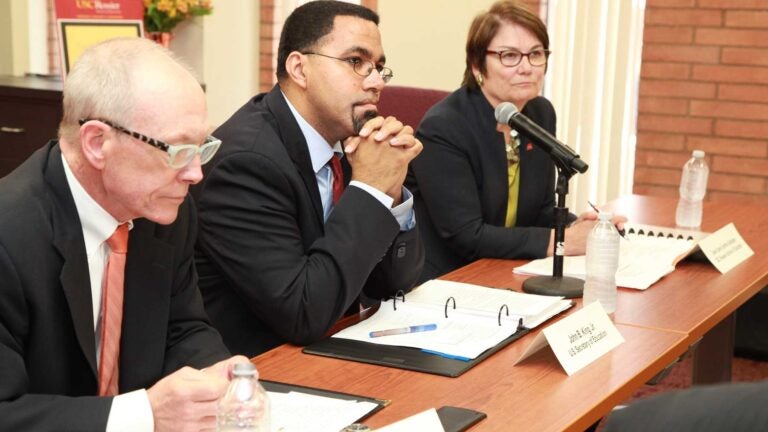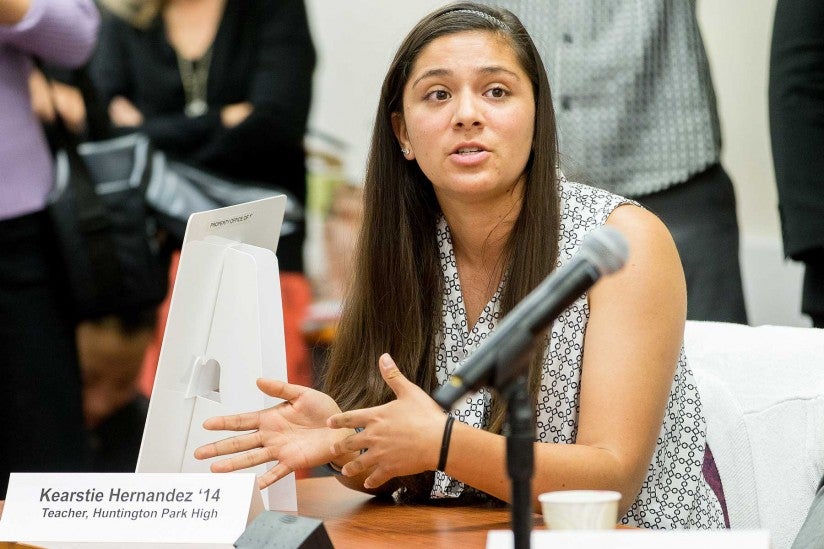
U.S. Undersecretary of Education Ted Mitchell, Secretary of Education John B. King Jr. and Dean Karen Symms Gallagher lead a roundtable at USC Rossier on improving teacher preparation. (Photo/Margaret Molloy)
Secretary of Education explains new teacher-prep rules during USC Rossier visit
John King Jr. focuses on new regulations tied to improving accountability in higher education
U.S. Secretary of Education John B. King Jr. announced long-awaited rules governing teacher preparation on Oct. 12, using the USC Rossier School of Education as a backdrop to put forward the result of a years-long process.
The new regulations are tied to the Department of Education’s goal of improving accountability in higher education as it relates to existing standards for teacher-preparation programs.
King and Undersecretary of Education Ted Mitchell remarked on the regulations at a roundtable of faculty, teachers and other education leaders held after a morning tour of USC Rossier. The tour included a visit to an on-campus class and a session with an online class.
We need to make sure that teacher preparation equips teachers with the skills to be as effective as possible in their classrooms.
John King Jr.
“There’s a sense of clarity the president has — and that Ted and I have — that teachers can save lives,” King said at the roundtable. “We need to make sure that teacher preparation equips teachers with the skills to be as effective as possible in their classrooms.”
The new rules, designed under the Higher Education Act, are meant to heighten accountability of traditional certification, alternative certification and online programs. Some major changes include:
- Increased data collection, including surveys of graduates and employers that show how many program alumni get hired into their chosen fields, in addition to placement and retention information.
- The reporting requirement will also look to tie student-learning outcomes to programs, but gives states flexibility in determining what those outcomes look like.
- Online or “distance education” is redefined to include any program in which 50 percent or more of the program’s required coursework is offered through online education.
- TEACH grants will be limited to programs that states determine to be effective.
The regulations will also be used to track how many graduates of programs are going into high-needs schools.
“One of the things we have to acknowledge is that we have some significant equity gaps around access to effective teaching,” King said. “And too often it’s our lower-income students, our students of color, our English-learners, that have the least access to effective teachers even though they need them the most.”
The full list of regulations is 695 pages long.
Dealing with delays

The release of the new rules is a victory of sorts for the Education Department. First put forth for review in December 2014, the finalization of rules had been delayed multiple times, including due to a wave of harsh criticism about earlier drafts. The most recent delay came in April so that the department could collect public comments specifically related to how to apply the regulations to online teacher-preparation programs.
USC Rossier became a powerhouse in online teaching in 2009, when it signed a multiyear contract with education technology company 2U; 2U provides the platform serving three of the school’s online master’s and doctorate programs. In April, the school and 2U renewed their contract through 2030.
For the USC Rossier class that entered this fall, 907 students are taking classes online, compared to 1,095 taking classes on campus.
“You can see from what’s happening at USC that there are great examples of tremendous leadership throughout the state,” King said after the roundtable. “And really this is an opportunity for states to leverage best practice. There’s no problem we face in education that isn’t being solved somewhere, and the question is: Can we scale those solutions? And there’s an opportunity here to do that.”
Undersecretary Mitchell noted that institutions like USC Rossier — notably, those in diversity-rich states like California — will be instrumental resources for states.
“The feedback loop is not only internal, but it’s across institutions,” Mitchell said. “Collaboration between teacher-preparation organizations is one of the ways almost everybody thinks we can use to move forward.”
A key step
USC Rossier Dean Karen Symms Gallagher said the regulations are one important step on the path toward improved teaching.
“One of the keys is always implementation, and it’s going to be a challenge. And we need to be mindful that it’s not just preparation, but induction and retention that are a major part of this work,” Gallagher said. “It’s great that states will have flexibility to create systems that work for them, and we at USC Rossier hope to be a leader in our state’s efforts.”
The department officials highlighted such flexibility, noting that there are not always obvious ways to evaluate teachers. An illustration of that point: One roundtable attendee, Kearstie Hernandez MAT ’14, is a science teacher at Huntington Park High School, but she is also the science fair director, safety coordinator, girls’ basketball team coach, assistant athletic director and professional development committee member.
While the regulations have already come under criticism for concerns about cost and effectiveness, others have hailed them for taking strong steps toward fixing an integral aspect of teacher quality.
“In our view, the final release of these regulations represent a major victory in the transformation of our educator-preparation system,” said Ben Riley, founder and executive director of Deans for Impact. His organization, of which Gallagher is a member, has been a strong proponent of increased accountability in teacher training. “The release of these regulations is a chance to make educator preparation more meaningful and rigorous — leading to better-prepared teachers and better outcomes for children.”



